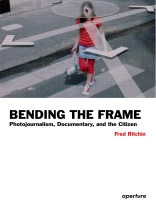In
Bending the Frame, Fred Ritchin–Professor of Photography & Imaging at New York University’s Tisch School of the Arts, and author of
After Photography–examines the complex relations between social justice and photojournalism in today’s oversaturated political and media climates.
Is visual journalism even effective at all, given the ease with which so many of us can simply record events? And how can the impact of iconic images from the Civil Rights Movement or the Vietnam War be compared to, say, the consequences of leaked images from Abu Ghraib? Do changes in strategy imply changes in accountability and responsibility for visual journalism as a whole?
Ritchin intends his discussion—which ranges across new media but also includes uses of video as well as a wide range of books and exhibitions—to provide critical tools with which to approach the various efforts of today’s visual (and 'citizen’) journalists and documentary photographers. He also examines the historical uses of photography and related media to inspire social change, the better to pose the critical question that lies at the heart of his book: How can images promote new thinking and make a difference in the world?
O autorze
Fred Ritchin is professor and associate chair of the Department of Photography and Imaging at New York University’s Tisch School of the Arts, and codirects the Photography and Human Rights Program at NYU with the Magnum Foundation. He is also director and cofounder of Pixel Press, which works with humanitarian groups to develop visual projects dealing with social justice issues. Ritchin has written for Aperture, Le Monde, the New York Times, and the Village Voice, and authored several books, including the prescient In Our Own Image: The Coming Revolution in Photography (Aperture, 1990, 2000) and the more recent After Photography (2009) and Bending the Frame (2013).












